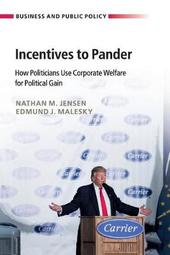
|
Incentives to Pander: How Politicians Use Corporate Welfare for Political Gain
Paperback / softback
Main Details
| Title |
Incentives to Pander: How Politicians Use Corporate Welfare for Political Gain
|
| Authors and Contributors |
By (author) Nathan M. Jensen
|
|
By (author) Edmund J. Malesky
|
| Series | Business and Public Policy |
|---|
| Physical Properties |
| Format:Paperback / softback | | Pages:270 | | Dimensions(mm): Height 230,Width 153 |
|
| Category/Genre | Political economy |
|---|
| ISBN/Barcode |
9781108408530
|
| Classifications | Dewey:338.922 |
|---|
| Audience | | Professional & Vocational | |
|---|
| Illustrations |
Worked examples or Exercises
|
|
Publishing Details |
| Publisher |
Cambridge University Press
|
| Imprint |
Cambridge University Press
|
| Publication Date |
13 June 2019 |
| Publication Country |
United Kingdom
|
Description
Policies targeting individual companies for economic development incentives, such as tax holidays and abatements, are generally seen as inefficient, economically costly, and distortionary. Despite this evidence, politicians still choose to use these policies to claim credit for attracting investment. Thus, while fiscal incentives are economically inefficient, they pose an effective pandering strategy for politicians. Using original surveys of voters in the United States, Canada and the United Kingdom, as well as data on incentive use by politicians in the US, Vietnam and Russia, this book provides compelling evidence for the use of fiscal incentives for political gain and shows how such pandering appears to be associated with growing economic inequality. As national and subnational governments surrender valuable tax revenue to attract businesses in the vain hope of long-term economic growth, they are left with fiscal shortfalls that have been filled through regressive sales taxes, police fines and penalties, and cuts to public education.
Author Biography
Nathan M. Jensen is Professor of Government at the University of Texas, Austin. His research focusses on government economic development strategies, firm non-market strategies and business-government relations, as well as the politics of oil and natural resources, political risk in emerging markets, trade policy, and international institutions. Edmund J. Malesky is a Professor of Political Economy and the Associate Chair of the Political Science Department at Duke University, North Carolina. He is a noted specialist in economic development, authoritarian institutions, and comparative political economy in Vietnam and has published extensively in leading political science and economic journals.
Reviews'The puzzle of investment incentives like tax breaks and regulatory exemptions is that although they are generally inefficient, governments around the world - from Kansas to Vietnam - use them to attract investors. In this provocative and wide-ranging book, Jensen and Malesky show that politicians choose these policies because they reap political benefits from doing so. By identifying the political logic that drives inefficient policies, this book reveals how citizens may press for better policymaking.' Thomas Pepinsky, Cornell University, New York 'Is all politics local? In this intriguing study, Jensen and Malesky show that though separated by geography and political systems, politicians in the United States, Canada, Russia, and Vietnam all use fiscal policy to generate and sustain political support. The authors masterfully weave a variety of evidence - individual level surveys and original data on policymakers' incentives - to show how short term fiscal policies often have dramatically negative long term consequences.' David Leblang, University of Virginia
|